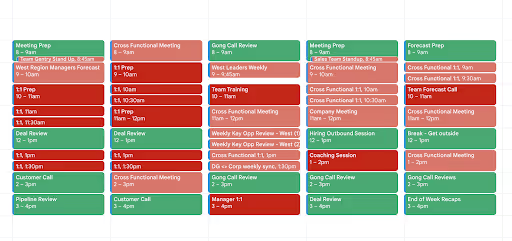One of the biggest issues facing sales managers today isn’t coaching their people—it’s organizing their calendar to protect their time.
I speak to tons of managers who are constantly putting out fires, swooping in to save deals, and feeling completely drained by the time they shut their laptop.
If you’re a sales manager, your calendar isn’t just a scheduling tool—it’s your playbook. The way you allocate your time determines your success and the success of your team.
Most managers fall into one of two traps:
- Running meetings back-to-back all day, leaving them burnt out by 5 p.m.
- Operating in a reactive state, firefighting all day without a sense of real progress.
Instead of reacting to every Slack message and random meeting request, take control by structuring your week into Value Blocks:
- A Blocks: Your Highest-Value Work
- B Blocks: Important, But Not As Critical
- C Blocks: Valuable, But Can Be Flexed
- D Blocks: Delegate And Empower
Here’s what that looks like on my calendar, let’s break it down:

A Blocks: Your Highest-Value Work
Nothing is more important than meeting with your reps every single week. This is where you have the biggest impact—coaching, developing, and driving performance.
A Blocks include 1:1s with your reps and preparing for those 1:1s. Block time for prep so you walk into these meetings ready to add value, not just react.
Beyond just scheduling 1:1s, make sure these sessions are actually productive.
Come prepared with key data points, coaching topics, and feedback loops that ensure your reps leave with clear takeaways.
A well-structured 1:1 doesn’t just cover deals—it focuses on skill development and long-term success.
B Blocks: Important, But Not As Critical
These are meetings that move the business forward but aren’t as directly tied to rep success. Think team meetings, cross-functional meetings, and pipeline reviews. Necessary? Yes. But should they dominate your calendar? No.
To maximize B Blocks, streamline your team meetings. Set clear agendas, ensure action items are assigned, and make sure these meetings don’t become redundant.
If a meeting doesn’t have a direct impact on pipeline growth or team efficiency, question whether it needs to happen at all.
C Blocks: Valuable, But Can Be Flexed
Gong reviews, customer calls, deal reviews—these help you stay sharp and close to the field. But they should never take priority over A and B Blocks. Protect your coaching time first, then fit these in where possible.
One way to optimize C Blocks is by setting themes. For example, dedicate one day per week to deep-dive Gong reviews. This ensures you stay close to what’s happening in the field without letting it consume random pockets of time throughout the week.
D Blocks: Delegate And Empower
If a task can be handled by one of your reps, pass it off.
Prepping a deck, responding to an internal request, coordinating a follow-up? Teach your reps to own these tasks. Not only does this free up your time, but it also helps top reps build leadership skills.
Delegation isn’t just about offloading work—it’s about developing your team. Identify high-potential reps and give them ownership of strategic tasks. This builds their leadership muscle and prepares them for future growth.
Put It Into Action
Block your A Blocks first. 1:1s and prep time are untouchable.
Schedule B Blocks where they fit best but don’t let them overrun A Blocks.
Use remaining time for C Blocks, but be ruthless with prioritization.
Push D Blocks off your plate entirely.
Final Thought: Audit Your Calendar
Want to know if you’re managing your time effectively? Look at last week’s calendar. How much time was spent in A Blocks? How often were you reacting instead of leading? A proactive manager controls their time—so take charge and make next week better.
Your calendar should reflect your priorities. If it doesn’t, you’re not leading—you’re just reacting.
***
That’s a wrap! If you want to learn more about how you level up your personal and professional performance, follow me on LinkedIn or reach out to me for coaching below:



.avif)













